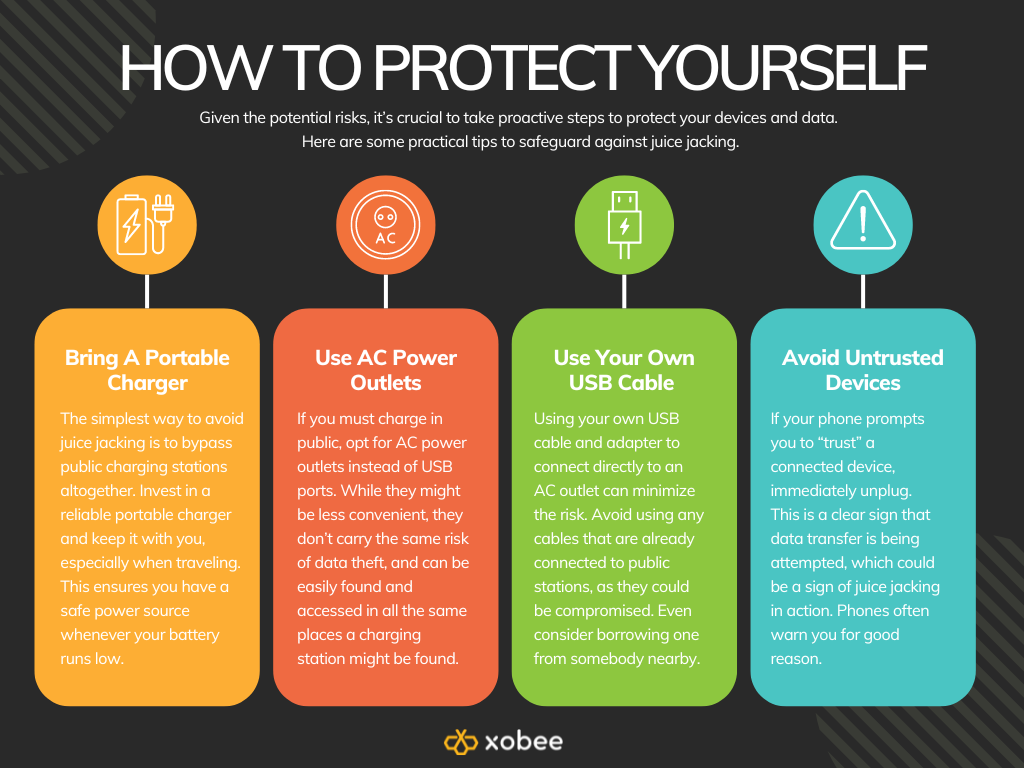FRESNO, California – Cody Sarhan, Communications Specialist
You’re rushing through LAX, juggling your luggage, sweating because it’s 102° outside, and your phone’s battery is at 2% — we’ve all been there. Like a lighthouse in a sea of chaos, you spot a public charging station nearby. But before you plug in, consider this: are you charging up or giving a stranger access to all your photos, videos, financials, and account credentials?
Learn more: How Xobee can help protect you from cyber threats
What is Juice Jacking?
Juice jacking is a type of cyberattack where hackers tamper with public charging stations to install malware on devices, locking them up or stealing sensitive information. The attack occurs when a compromised USB port or cable transmits malicious software to your device, potentially giving criminals access to everything from your personal data to your financial accounts.
The most alarming part? The malware can silently operate in the background, often going unnoticed until it’s too late. Your phone might look fully charged, but in reality, it’s now a Trojan horse carrying a thief ready to ransack your phone.
How Common Is This Threat?
While high-profile cases of juice jacking remain scarce, the threat is very real. As cybersecurity experts continue to raise alarms, the FCC and FBI have both issued warnings about the risks associated with public USB charging stations. The absence of widespread reports doesn’t mean the danger isn’t present — it simply highlights the stealthy nature of this cyberattack.
The Corporate Risk: Juice Jacking and Business Security
For businesses, the risks associated with juice jacking extend beyond personal data. If an employee’s device is compromised, it could provide a backdoor into corporate networks, leading to devastating data breaches and financial loss. Companies should educate their employees about this threat and provide them with tools like data blockers and portable chargers to minimize risk during business travel.
Leveraging Xobee to Better Protect Yourself
At Xobee Networks, we understand the complexities of modern cybersecurity threats and offer comprehensive solutions to keep your business safe. From IT consulting and cloud hosting to robust backup redundancies and data restoration services, we ensure your technology infrastructure is resilient against all threats.
Our cybersecurity services, including virus protection and spam filtering for emails, provide an additional layer of defense, safeguarding your business from both known and emerging cyber risks.
Don’t wait for a breach to happen. Trust Xobee Networks to be your one-stop shop for all your business technology needs. Protect your data, empower your team, and secure your future. Contact one of our highly skilled technicians today to learn more.
Xobee now has engineers servicing clients within Fresno, Clovis, Madera, San Jose, Sacramento, San Francisco & the Bay Area, Los Angeles, Santa Monica, Las Vegas, Bakersfield, San Diego, San Luis Obispo, Anaheim, Palm Springs, and more.
Cody Sarhan | Communications Specialist, Xobee Networks

